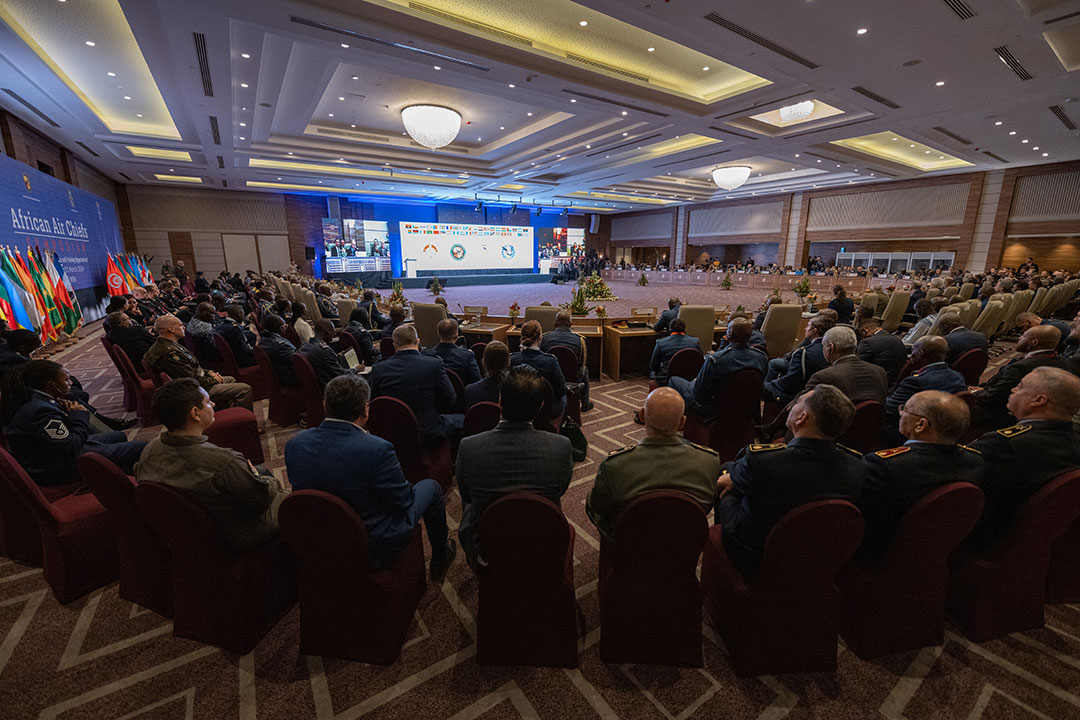Air Chiefs Gather to Deepen Partnerships
ADF STAFF
In one of Africa’s largest gatherings of air force commanders, leaders discussed how increased mobility and strategic partnerships can help restore peace to some of the continent’s most troubled regions.
The occasion was the Association of African Air Forces’ 2024 African Air Chiefs Symposium in Tunis, Tunisia. About 270 people from 37 African nations attended, including 27 of 30 association members. The meeting ran from February 26 through March 1. Topics included opportunities for increased partnerships, peacekeeping, recognizing the inherent value of enlisted personnel and providing more resources to female recruits.
Key speakers included Imed Memmich, Tunisia’s minister of defense; Lt. Gen. Mohamed Hajem, chief of staff of the Tunisian Air Force; Gen. James Hecker, commander of United States Air Forces in Europe-Air Forces Africa; and Gen. Birame Diop of Senegal, military advisor in the United Nations Department of Peace Operations.
Speakers at the opening ceremonies stressed the need for participation, innovation and deliberation. They called for improved relations within and among the continent’s air forces, while showing respect for differences. Education for all of the air forces’ personnel, speakers said, has to be a top priority.
In his opening speech, Diop emphasized the peacekeeping aspect of Africa’s armed forces, saying that modern military cooperation among countries dates to World War II, when U.S. President Franklin Roosevelt met with British Prime Minister Winston Churchill. That meeting produced the 1941 Atlantic Declaration, which was, he said, “the foundation to the U.N. charter.”
Africa’s peacekeeping missions are distinctive, Diop said, because in other parts of the world, such missions involve disputes among countries, while in Africa, the disputes involve multiple forces within a single country.
Diop said there are three defining features of African peacekeeping missions: impartiality, the use of force only in self-defense, and a refusal to deploy missions to places where “we aren’t invited.” He noted that recent missions have been plagued with misinformation campaigns, an increased level of violence, a surge in the use of improvised explosive devices and “attacks on (United Nations) blue helmets directly.”
The symposium also included extensive discussions on ways to improve training for enlisted Soldiers and Airmen, including better coordination between noncommissioned officers and air chiefs. Hecker pointed out the need for a “great enlisted force.”
Symposium speakers also emphasized the need to devote more time and attention to Women, Peace and Security (WPS) issues, which, they said, have only in recent years become a priority. WPS did not become a formal topic for symposium discussion until the 2023 meeting in Senegal. Women’s issues, they said, have been shortchanged in the past by a lack of resources, a failure to recognize gender equality and out-of-date politics. They said that WPS must become a permanent recognized group within the association. They noted that Africa’s militaries have to improve in recruiting women by emphasizing better housing for them, designing gender-specific uniforms and offering more services for pregnant staffers.
Female recruits, they said, will need to demand equality with their male counterparts. One WPS workshop session involved the psychology of women in the military.
During the seminar, the chiefs also flew to two Tunisian air bases to tour them and observe field training. Others at the conference visited the Tunisian Air Force Academy.


Comments are closed.